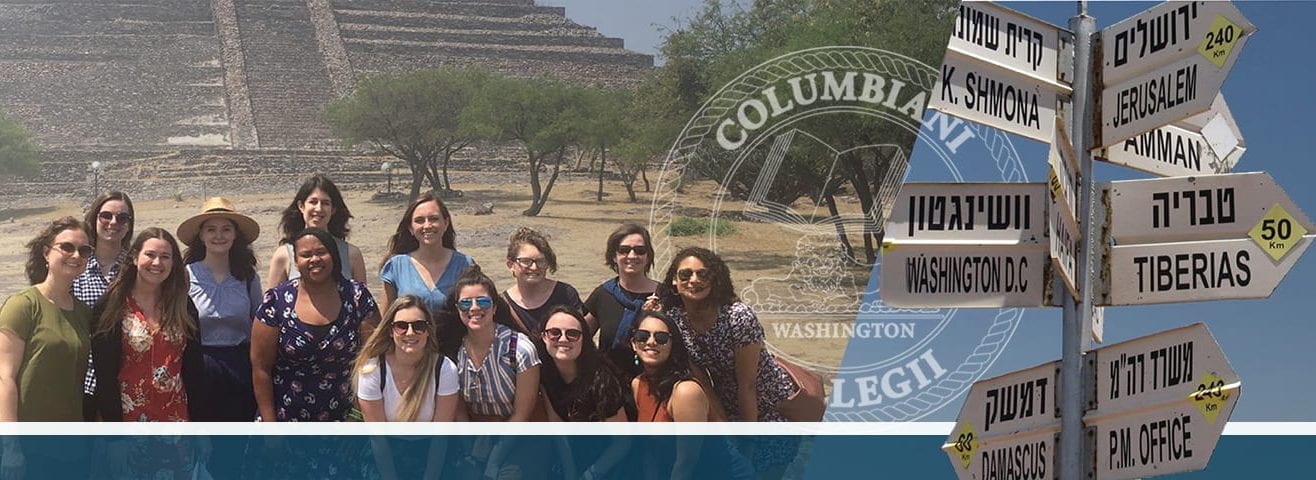
Short-Term Abroad Programs (STAP) present a fantastic way to enhance the academic experience for both students and faculty. While traveling abroad together, groups can find new layers of knowledge and culture that they can then bring back and share with the GW community.
Some topics may seem like a natural fit for a study abroad course, such as studying Shakespeare in London or examining the history of WWII in Germany; however, the Office of Global Initiatives encourages faculty across all disciplines to consider how to bring an international component to their courses.
Past GW Short-Term Abroad Programs have included Art Therapy in India, Music in Brazil, Education Policy in Turkey, Urban Sustainability in Panama, Health Management in Israel, and many more programs around the world.
For faculty members interested in creating courses with an overseas component for undergraduate or graduate students, you can learn more about it by visiting the links below.
Faculty-Led Short-Term Program Structure
- Short-Term Abroad Programs are mostly offered as spring courses with an abroad experience during the Spring Break or in the Summer Semester. They typically contain an embedded abroad component that is part of an existing on-campus course.
- Only in the Summer Semester may the entire course be allowed to take place abroad. A summer course that is hosted entirely abroad may offer online modules prior to travel to prepare students for the trip.
- The course may cover topics offered in current curricula or explore new academic material.
- For scheduling and administrative purposes, short-term abroad courses offered by CCAS may only be cross-listed with other departments and programs within CCAS.
- Faculty need to obtain course approval from the Department Chair and Administrative Heads prior to submitting the proposal in GW Passport using this template.
- Faculty should contact ccasglobal@gwu.edu to obtain the budget template.
- Please note the minimum enrollment rate requirement:
| Student Type | Semester Term | Minimum Enrollment Rate |
| Undergraduate | Spring & Fall | 15 |
| Graduate | Spring & Fall | 9 |
| Undergraduate & Graduate | Summer | 8 (subject to change) |
Designing a Program
- Choose a topic: This is perhaps the most important step. What will peak student interest? How many students might be interested? Consider asking current students for their suggestions, and consider if the course will appeal to students outside your own home department.
- Choose a location: Selecting a familiar location will make it easier to plan in-country logistics and advise students on safe and culturally-appropriate behavior. If you do not have expertise in the country, is there someone who can assist? Does the location enhance the course material? Is it a place students would be interested in visiting?
- Choose the timing and duration: Is the course more appropriate embedded in a fall or spring semester or offered over the summer? Consider weather, academic calendar, holidays, and travel time to your destination. It is possible to design a course around a festival, conference, or other major event, if desired. How much time in-country is enough?
- Travel outside of Spring Break & Summer: If your proposed travel is outside of Spring Break and Summer, please review the college policy on how we review such proposals.
- Consider the cost: What will it cost to run the program? Will the cost be particularly high and perhaps prohibitive for students? Consult knowledgeable sources and seek price quotes on expected costs, such as airfare, lodging, meals, local transportation classroom costs, honoraria, and cultural activities.
- Consider the logistics: How many students do you expect? Where will the group stay, and how will you travel around the city? Can you organize all course arrangements or do you need to hire a company to assist? Do you need to hire a teaching assistant to support the course?
- General Rules on Lodging (Subject to Change)
- Airbnb is not allowed to be used as lodging options for groups in a STAP program. It is allowable for independent research travelers such as faculty or graduate students only after they submit a "peer-to-peer"lodging request form that University Risk Management must approve.
- Hostels can be considered only if they have locked bedrooms and private baths that are only used by GW students. We don't allow for multiple person dorms where our students would share with strangers with no privacy or security. The Hostels also need to have 24 hour front desk coverage in order to be considered.
- Students should stay at the same lodging. If running into a capacity issue, then they could be split into two lodging locations that are near each other. Out of the two faculty chaperones, at least one should stay with the students so that immediate attention and support can be given in case of emergency. The other chaperone can stay at another location that is close by and easily accessible to the main group.
- If the faculty is staying at a different lodging, it cannot be located at a far better part of the city and the lodging quality cannot be far better than the one used by the rest of the group.
- Program Chaperone
- GW requires at least two chaperones per travel with students program. Once the total program participant number exceeds 24, a third chaperone is required. Program chaperones need to be GW affiliated individuals, faculty, staff and graduate students, etc. Any non-GW affiliated individuals serving this role needs to be reviewed and approved by the college. If approved, an affiliation agreement needs to be established with the individual for his or her participation as a chaperone in the program.
- In any event where the primary course instructor/program leader encounters an emergency situation, which ends up delaying or preventing the leader from traveling with the group, the second chaperone should be fully briefed on the program itinerary beforehand so that he or she is able to continue leading the program independently.
- Non-Participant Accompaniment
- Non-participants accompanying students, faculty, or staff of GW Study Abroad Programs are not eligible to attend class sessions or other program-related activities during the study abroad program. Class meetings, site visits, field trips, dinners, receptions, program-provided transportation, program-provided lodging, and all program-related events are open only to students registered for the course, program faculty, and staff. Alumni and auditors may join the course only as full fee-paying students. Please be aware that the university will not provide any support services or assume any responsibility for accompanying non-participants.
- If Travel Does Not Happen
- As part of the overall program plan, faculty were already asked to include a contingency plan for their respective course to plan for the scenario where travel is not deemed safe or viable to happen despite its earlier program approval. In that case, faculty should communicate with students enrolled in the class in a timely manner on how the short term abroad component of the course can be switched to on-campus to ensure academic continuity.
- General Rules on Lodging (Subject to Change)
Approval Process
Faculty members shall gain access in GW Passport to submit proposal by filling out the Short-Term Abroad Proposal application. The proposal application requests detailed information about the course and requires the submission of a detailed syllabus, itinerary, and budget.
As part of the process, professors must seek approval for their proposal from their department chair or program head before the CCAS Dean’s Office evaluates its curricular fit and overall program viability including cost and safety. Once it’s approved by the Dean’s Office, CCAS Global will work with the Office of Study Abroad to administer the entire process.
Faculty Director's Role
Pre-Approval
Along with teaching the course, faculty members leading Short-Term Abroad Programs serve many other roles. Thus, professors teaching these courses are given the title "Faculty Director." The Faculty Director’s responsibilities include:
- Develop the course syllabus, itinerary and budget
- Market the course and discuss course details with interested students
- Review student applications and select admitted students in GW Passport
- Create and confirm logistical arrangements for the course, including lodging, transport, classroom space, lectures, meals, and so on
- Help prepare students for the course and travel
- Lead students abroad, providing assistance in times of student need or crisis Submit financial reconciliations
- Reflect on the impact of the course, and offer feedback, stories of success, or suggestions for improvement to the Office for Study Abroad
Post-Approval
- Submit expenses by 40 days
- Check in within 2 weeks of return date
CCAS Global’s Role
The CCAS Office of Global Initiatives provides overall administrative support, guidance for faculty and students. The responsibilities include:
- Advise faculty members with questions about the proposal process
- Support the Dean in selecting faculty proposals
- Build course websites and create program flyers
- Manage student applications through GW Passport
- Communicate with students about application and commitment process
- Schedule courses
- Register students
- Procure international travel and lodging for the programs
- Provide health and safety information to students prior to departure
- Enroll students in international health insurance
- Provide pre-departure training for faculty, including detailed financial and risk management information
- Collect student evaluations
Department Admin's Role in Scheduling
Pre-Approval Required
Before a proposed course is entered into scheduling, it must obtain approval from CCAS Global. Once approved, CCAS Global will notify the Faculty Lead, Department Chair & Admin via email. Next, the Department Admin needs to set up this course as restrictive by emailing ccsched@gwu.edu.
Restricted Course
On the scheduling end, there are specific requirements on how this course should appear on the schedule of classes. In the email to ccsched@gwu.edu, you will need to entail the Course Name and CRN and submit the "Special Approval Restrictions" to with the Instructor Signature or Departmental Approval. The restriction needs to apply for the cross listed sites. For example, STAP courses are "Restricted" and students are not allowed to register on their own as everyone needs to go through an application process in GW Passport. Upon being accepted, CCAS Global will register the eligible students.
Comment to Appear with the Course
In addition, the following sample comment must be displayed with the course on the schedule of class: “This is a short-term abroad course with an abroad travel component in location, from start date to end date of year. Special program fee applies. Must contact the CCAS Office of Global Initiatives to register.”


